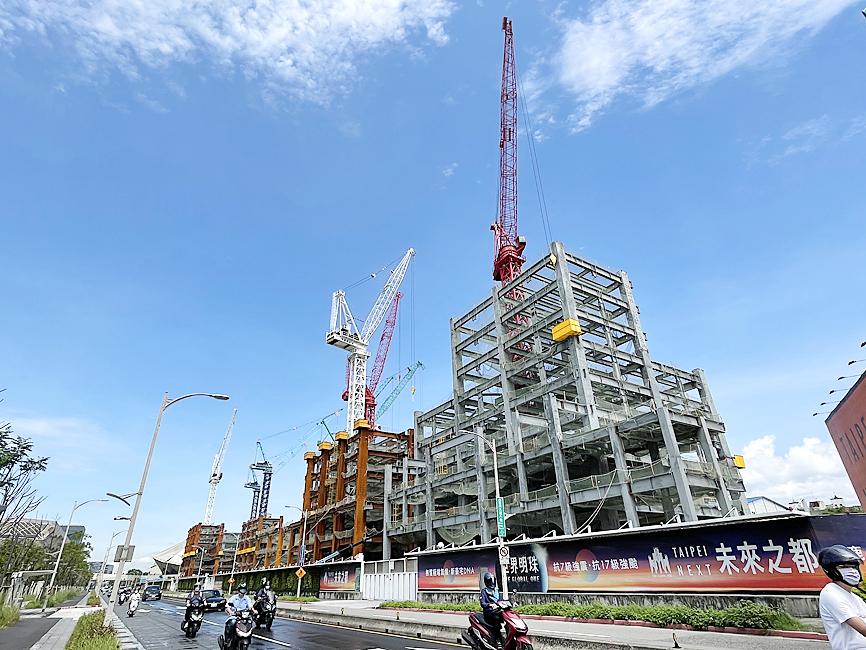Academia Sinica yesterday raised its forecast for Taiwan’s GDP growth this year to 5.05 percent, from the 4.24 percent it projected in December last year, as an improving global economy is bolstering exports and private investment is expected to more than offset subdued consumer activity.
The upward revision came after exports fared strongly in the first half of the year, with the momentum forecast to extend through the rest of the year, it said.
Exports are expected to expand 15.21 percent year-on-year to NT$14.66 trillion (US$523.48 billion) this year, while imports are predicted to increase 15.98 percent to NT$11.17 trillion, thanks to a rapid economic recovery in the US, Europe and other parts of the world, Academia Sinica research fellow Ray Chou (周雨田) told an online news conference in Taipei.

Photo: CNA
That would give Taiwan a trade surplus of NT$3.45 billion, up 11.5 percent from a year earlier, on the back of solid demand for electronics used in smartphones, laptops, wearables, televisions and vehicles, Chou said.
Non-tech products should also benefit from inventory replenishment as governments worldwide step up infrastructure spending and people increasingly return to leading normal lives, he said.
In US dollar terms, exports and imports surged 30.99 percent and 28.63 percent year-on-year respectively in the first six months of this year.
While the pace might remain vigorous, it could slow moving forward due in part to a high base effect, Academia Sinica said.
MediaTek Inc (聯發科), the world’s top 5G smartphone chip designer, on Tuesday said that it was looking at flat revenue with a slight upward bias for this quarter, despite the arrival of the high season for technology products.
Apple Inc on Tuesday said that component shortages would affect sales of its iPhones and iPads this quarter.
Academia Sinica expects private investment to grow 8.9 percent this year as local semiconductor firms aggressively invest in advanced technologies to maintain their competitive edge and expand capacity to meet customer needs.
Taiwanese shipping companies are also investing in new container vessels to help ease a global shortage, which has slowed delivery times and contributed to port congestions and record-high freight rates.
Domestically, private consumption is forecast to increase by a mild 2.05 percent from last year, affected by the COVID-19 outbreak and disease prevention measures, Chou said.
The outbreak appears to be under control and the government might soon introduce stimulus programs to reinvigorate consumer spending, Chou said, urging policymakers to distribute consumer vouchers as early as possible if they plan to do so to support affected businesses.

SEEKING CLARITY: Washington should not adopt measures that create uncertainties for ‘existing semiconductor investments,’ TSMC said referring to its US$165 billion in the US Taiwan Semiconductor Manufacturing Co (TSMC, 台積電) told the US that any future tariffs on Taiwanese semiconductors could reduce demand for chips and derail its pledge to increase its investment in Arizona. “New import restrictions could jeopardize current US leadership in the competitive technology industry and create uncertainties for many committed semiconductor capital projects in the US, including TSMC Arizona’s significant investment plan in Phoenix,” the chipmaker wrote in a letter to the US Department of Commerce. TSMC issued the warning in response to a solicitation for comments by the department on a possible tariff on semiconductor imports by US President Donald Trump’s

The government has launched a three-pronged strategy to attract local and international talent, aiming to position Taiwan as a new global hub following Nvidia Corp’s announcement that it has chosen Taipei as the site of its Taiwan headquarters. Nvidia cofounder and CEO Jensen Huang (黃仁勳) on Monday last week announced during his keynote speech at the Computex trade show in Taipei that the Nvidia Constellation, the company’s planned Taiwan headquarters, would be located in the Beitou-Shilin Technology Park (北投士林科技園區) in Taipei. Huang’s decision to establish a base in Taiwan is “primarily due to Taiwan’s talent pool and its strength in the semiconductor

Industrial production expanded 22.31 percent annually last month to 107.51, as increases in demand for high-performance computing (HPC) and artificial intelligence (AI) applications drove demand for locally-made chips and components. The manufacturing production index climbed 23.68 percent year-on-year to 108.37, marking the 14th consecutive month of increase, the Ministry of Economic Affairs said. In the first four months of this year, industrial and manufacturing production indices expanded 14.31 percent and 15.22 percent year-on-year, ministry data showed. The growth momentum is to extend into this month, with the manufacturing production index expected to rise between 11 percent and 15.1 percent annually, Department of Statistics

An earnings report from semiconductor giant and artificial intelligence (AI) bellwether Nvidia Corp takes center stage for Wall Street this week, as stocks hit a speed bump of worries over US federal deficits driving up Treasury yields. US equities pulled back last week after a torrid rally, as investors turned their attention to tax and spending legislation poised to swell the US government’s US$36 trillion in debt. Long-dated US Treasury yields rose amid the fiscal worries, with the 30-year yield topping 5 percent and hitting its highest level since late 2023. Stocks were dealt another blow on Friday when US President Donald